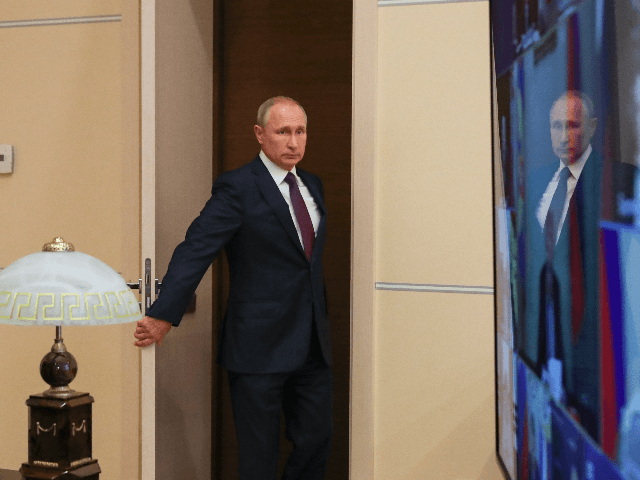Russian President Vladimir Putin plans to get vaccinated against the Chinese coronavirus to safely visit Seoul, South Korea, Kremlin spokesperson Dmitry Peskov told reporters Tuesday.
Peskov noted that vaccination would help “decrease the level of epidemiologic precaution measures” in this regard. He did not specify which of the many vaccine candidates around the world Putin would take, though he appeared to imply that Putin would choose a Russian vaccine candidate that he personally approved last month, despite it not passing Phase Three clinical trials.
“Let’s wait until he makes this decision himself,” he told reporters, promising not to keep it “secret.”
Last month, Putin claimed his daughter had taken the experimental vaccine candidate, but never specified which of his two daughters did so, nor did either of them confirm this claim.
The announcement comes in the wake of a phone call between Putin and South Korean President Moon Jae-in in which Putin reportedly promised to take a vaccine and pay a diplomatic visit to Seoul, according to the Russian news agency Tass.
Asked if the announcement signaled a return to in-person diplomacy, Peskov downplayed the implications, insisting that Putin taking a vaccine was focused largely on enabling this particular South Korean visit.
“In the context of the conversation he was talking exclusively about his potential visit to South Korea. He did not mention other trips,” Peskov said. He did, however, note that inoculation would make other travel abroad much easier for Putin.
The international community has treated Russia’s claim to win the race to making a functional Chinese coronavirus vaccine with a large degree of cynicism. Dr. Antony Fauci, the director of the National Institute of Allergy and Infectious Diseases (NIAID), cast doubt on the safety of the vaccine immediately following Putin’s announcement.
“I hope that the Russians have actually definitively proven that the vaccine is safe and effective,” he said. “I seriously doubt they’ve done that.”
One month after the announcement, Russian scientists published the results of the trials. Though the scientists claimed the vaccine candidate produced a noticeable effect in all of the trial subjects, the parameters of the study drew sharp criticism. The study had no control group and used a small sample size — which only included men in their 20s and 30s, the Associated Press reported.
Despite concerns about the vaccine candidate’s safety and effectiveness, it has stirred interest in nations struggling under the pandemic, particularly those closely allied with the Russian state. Shortly after Putin announced the vaccine’s approval, Philippine President Rodrigo Duterte volunteered to take the vaccine candidate in public and serve as one of its test subjects. The Philippines has suffered a severe outbreak of the virus in recent months.
Duterte is 75 years old and suffers from several chronic illnesses, making him ineligible to safely take an experimental vaccine.
Belarusian President Alexander Lukashenko claimed last August that Putin had promised Belarus would be the first nation to receive an effective Russian vaccine. Lukashenko expressed confidence in the vaccine’s safety, citing Putin’s willingness to test it on his own family. “I believe him for a reason: he tested this vaccine on his family,” he said.
In his speech to the United Nations General Assembly (UNGA) last week, Putin touted Sputnik V as the answer to the global pandemic and urged world leaders to embrace the vaccine, despite concerns over its safety and effectiveness. He further offered to provide the vaccine free of charge to all U.N. staffers, insisting it was “reliable, safe, and effective.”

COMMENTS
Please let us know if you're having issues with commenting.